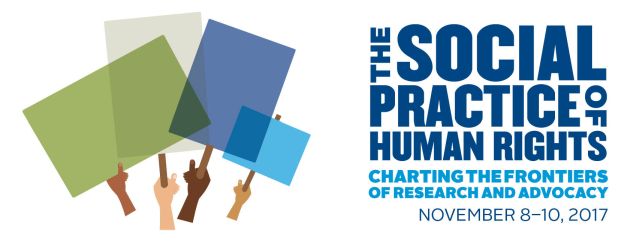
Start Date
11-8-2017 1:30 PM
Keywords
Political theology, liberation, conceptualization, human rights, resistance
Abstract
Progressive political theologies can expand and deepen both the strength and the conceptualization of human rights advocacy. However, not all political theologies are an effort to defend human dignity; neither are all understandings and practices of human rights. The validation of progressive political theologies as well as the validation of human rights conceptualizations comes from their capacity to concretely change the lived reality of poor and oppressed peoples of the world.
As with political theologies, there is a constant struggle over the control of how to conceptualize what constitutes a human rights issue. While many communities of faith find liberating practices in their traditions, others find oppressive and discriminatory practices. The same is true for the control and use of human rights conceptualizations. While human rights have been employed to protect and respect the most vulnerable sectors of society, human rights have also been exploited to start unjust wars, to validate the discrimination of certain identities, or to defend class inequality. When political theologies and/or human rights discourses become a liberating part of the struggles of the poor and oppressed, when they offer languages, ideas, and practices that not only sustain but strengthen resistance to oppression, domination, and discrimination, they are themselves re-conceptualized as the tools for human emancipation they were meant to be.
As the South American country of Colombia navigates through these historic times of peace processes and hopes to end more than 50 years of armed conflict, many faith communities and faith-based organizations are articulating the kind of society they would like to see arise through these new opportunities.
How have faith-based views on human rights in Colombia developed community-led resistance to oppression, domination, and discrimination? What has been the role of faith communities in articulating human rights as liberating to poor and oppressed Colombians?
Included in
Civic and Community Engagement Commons, Inequality and Stratification Commons, Latin American Studies Commons, Other Political Science Commons, Peace and Conflict Studies Commons, Political Theory Commons, Politics and Social Change Commons, Race and Ethnicity Commons, Sociology of Religion Commons, Work, Economy and Organizations Commons
Faith-Based Resistance, Human Rights, and Emancipatory Practices
Progressive political theologies can expand and deepen both the strength and the conceptualization of human rights advocacy. However, not all political theologies are an effort to defend human dignity; neither are all understandings and practices of human rights. The validation of progressive political theologies as well as the validation of human rights conceptualizations comes from their capacity to concretely change the lived reality of poor and oppressed peoples of the world.
As with political theologies, there is a constant struggle over the control of how to conceptualize what constitutes a human rights issue. While many communities of faith find liberating practices in their traditions, others find oppressive and discriminatory practices. The same is true for the control and use of human rights conceptualizations. While human rights have been employed to protect and respect the most vulnerable sectors of society, human rights have also been exploited to start unjust wars, to validate the discrimination of certain identities, or to defend class inequality. When political theologies and/or human rights discourses become a liberating part of the struggles of the poor and oppressed, when they offer languages, ideas, and practices that not only sustain but strengthen resistance to oppression, domination, and discrimination, they are themselves re-conceptualized as the tools for human emancipation they were meant to be.
As the South American country of Colombia navigates through these historic times of peace processes and hopes to end more than 50 years of armed conflict, many faith communities and faith-based organizations are articulating the kind of society they would like to see arise through these new opportunities.
How have faith-based views on human rights in Colombia developed community-led resistance to oppression, domination, and discrimination? What has been the role of faith communities in articulating human rights as liberating to poor and oppressed Colombians?


